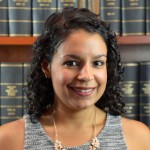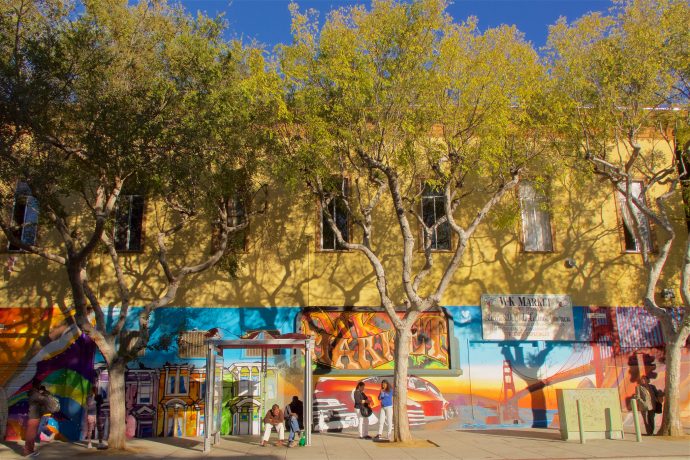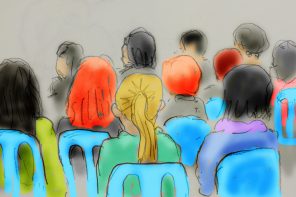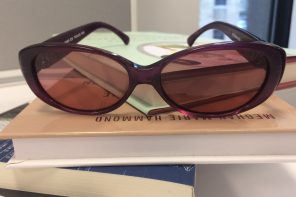This was my first year attending the MLA convention as a Connected Academics representative, and I was encouraged by the number of energizing sessions that explored and celebrated the range of careers accessible to humanities PhDs. Throughout the sessions, it became clear that one of the most sought-after skills graduate students develop is the ability to translate information for a number of audiences. As a Latina and a first-generation graduate student, it struck me that, aside from the formal opportunities I’ve sought to expand my skill set, the embodied, lived experience that I’ve gained will prove especially relevant as I embark on a job search across a variety of fields.
As Dr. Ruha Benjamin eloquently expressed during her talk on a Connected Academics panel on mentorship in the humanities, graduate students are often asked, implicitly or explicitly, to construct a professional identity that privileges academic experiences over the extracurricular. This feeling of separating mind and heart can be especially acute for those who already fail to conform to the norms of the academy along the axes of race, gender, class, and ability. I came away from the session, which sparked a conversation about diversity and the role of faculty mentorship, wondering how we might bridge the gap between mind and heart and thereby bring more diversity to our discussions of career diversity.
One way to bridge this gap is to reframe our lived experiences as opportunities. For example, I came up with an alternative résumé that has helped me consider how I have been preparing myself for a variety of careers, often without even noticing.
Code-Switching to Strengthen Community Ties
Code-switching refers to a speaker’s shifting between languages depending on environment. We might expand the definition beyond oral shifts in how one communicates to understand code-switching as including adapting to different registers—for example, the way you dress or present yourself in a particular context. The more I thought about the concept of code-switching, the more I realized that cross-cultural translation, beyond the linguistic, is something I do every day—especially when I interact with my family.
We shift in register or tone because we want to connect with a different audience and strengthen our ties to a particular community. Talking to my Dominican mother in Spanish, for example, about what exactly I “do” in graduate school and why it’s taking “so long” has become a regular opportunity for me to find new ways to explain my research and teaching—in short, the work behind the degree—to a sometimes skeptical audience. These conversations have been excellent training for how to quickly get to the “so what?” behind what I do, and with each attempt I have grown more confident in my ability to identify and justify the concrete elements of my work by focusing on my mother’s point of view and tapping into what she finds most interesting or valuable.
Living between Worlds
As an extension of code-switching, living between worlds emphasizes the variety of spaces we inhabit and how we change and adapt to these new environments, and the different identities that form who we are. It can be challenging to compartmentalize ourselves in these ways. On the one hand, we strive to embrace the professional standards of our disciplines; on the other, we feel the pull to continue to engage with our communities through volunteer work, activism, and creative pursuits—which are all incredibly valuable on the nonacademic job market but are often mistakenly considered little more than distractions from the “real work” of our research.
These engagements demonstrate a connection to a variety of communities and constituents, a commitment to particular values and goals, and a deep understanding of difference. As I heard frequently during the convention, building a career at foundations and philanthropic institutions, museums, public humanities organizations, and media outlets—places where humanities PhDs can thrive—requires the ability to understand the needs of different communities and a willingness to speak directly to them.
Embracing the Side Hustle
Of course, you will be most competitive for a nonacademic career if you have tangible experiences doing a variety of work, and embracing the “side hustle,” or side job, allows you to do that. Although the need to secure additional work is not exclusive to one community, given the overlap of race and class in our society, students of color often face particular economic challenges in supporting themselves through a multiyear degree program. Therefore, if we are to embrace diversity across race as well as socioeconomic class in the academy, I suggest the need for both graduate students and graduate programs to positively acknowledge the many kinds of work within and beyond the confines of the academic that graduate students need or want to do to support themselves. In my own case, for a variety of reasons that include financial flexibility and an urge to satisfy my tendency to be a “Jane of all trades,” I have embraced opportunities to take on new projects that are completely unrelated to my dissertation work.
From teaching sixth graders during the summers for the nonprofit organization Prep for Prep to translating academic texts and creating presentations for department functions, I’ve selectively taken on additional short-term paid work that I felt would enhance my skill set and activate a different part of my brain. Although we are often discouraged from dividing our attention in this way, taking on additional but manageable projects can help you maintain your sanity and build confidence in your abilities, both of which can indirectly enhance your research.
Expanding Our Definition of Valuable Experience
Expanding our definition of valuable experience allows for a wider range of voices to enter discussions about possible futures for humanities PhDs. Encouraging community engagement and work beyond academic research strengthens graduate students’ commitments to their fields of study by making the connections between the theoretical and the practical more concrete. Making these connections becomes increasingly important in a society that continues to challenge the worth of a PhD, and highlights the diverse range of experience graduate students bring to and take from the graduate experience.
That experiences not immediately thought of as résumé-worthy clearly have both personal and professional value shows that there are many important conversations we still need to have about what counts as experience and what does not. I am still building who I am in significant ways, even when I think I’m off the clock, and I encourage graduate students to reflect on the many kinds of work they do, consciously or unconsciously, over the course of their graduate careers. You might be surprised by how much you are already doing.
 Carolyn Ureña is a PhD candidate in comparative literature at Rutgers University and a 2016–17 Ford Foundation Dissertation Fellow. Her dissertation project, “Invisible Wounds: Rethinking Recognition in Decolonial Narratives of Illness and Disability,” brings the racial-phenomenological perspective of revolutionary Martinican psychiatrist Frantz Fanon into conversation with discourses of black lived experience and bodily disruption in United States and Caribbean literature and film. She earned her MA in English language and literature from the University of Maryland, College Park, in 2011, and her AB in comparative literature from Princeton University in 2008. As an interdisciplinary researcher she is passionate about building on the links between the humanities and medicine. In her work as a fellowship advisor at GradFund, the graduate fellowship advising office of the Rutgers Graduate School–New Brunswick, she enjoys helping graduate students across the disciplines secure external research funding through individual peer mentoring meetings and grant writing workshops.
Carolyn Ureña is a PhD candidate in comparative literature at Rutgers University and a 2016–17 Ford Foundation Dissertation Fellow. Her dissertation project, “Invisible Wounds: Rethinking Recognition in Decolonial Narratives of Illness and Disability,” brings the racial-phenomenological perspective of revolutionary Martinican psychiatrist Frantz Fanon into conversation with discourses of black lived experience and bodily disruption in United States and Caribbean literature and film. She earned her MA in English language and literature from the University of Maryland, College Park, in 2011, and her AB in comparative literature from Princeton University in 2008. As an interdisciplinary researcher she is passionate about building on the links between the humanities and medicine. In her work as a fellowship advisor at GradFund, the graduate fellowship advising office of the Rutgers Graduate School–New Brunswick, she enjoys helping graduate students across the disciplines secure external research funding through individual peer mentoring meetings and grant writing workshops.







